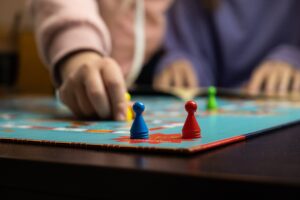Using board games to learn
 Boosting your child’s brain development and life skills while having fun sounds too good to be true. Here we look at how board games can do just that!
Boosting your child’s brain development and life skills while having fun sounds too good to be true. Here we look at how board games can do just that!
Board games have been around in one form or another for thousands of years. While they offer an entertaining way to disconnect from the stresses of daily life, they also bring a whole host of educational benefits for kids. Next time you feel like you’re taking the easy way out by playing a board game with your child instead of something more obviously educational, don’t worry. Playing board games will help your little one’s brain development in lots of different ways. So pull out the family favourite game for one of the best combinations of fun and learning there is!
6 ways board games can boost your child’s mind
Let’s run through the variety of ways that playing board games can help your child’s development.
Attention span
Poor attention span and the lack of an ability to focus is one of the biggest issues affecting young people today. So much of what children interact with on a daily basis is short and rapid bursts of entertainment. TikTok and YouTube shorts are the two primary examples. Board games are almost the exact opposite of these forms of entertainment.
Board games demand focus to succeed and they tend to move quite slowly. At first, this can be a struggle for children (and adults!) but it’s important to persevere and leave digital distractions, such as phones or TV, off or in another room. The slow, analogue nature of board games will train your little one to focus for longer periods of time and this will stand to them in virtually every part of their education and life.
Learning
Board games have something for all children. They are a fantastic way to help your little early learner figure out how to count and to identify different colours and shapes. It also trains aspects of their mind-body connection, such as dexterity and hand-eye coordination.
Studies have shown that board games encourage the development of the frontal lobe in the brains of children and teenagers. As your little ones grow and become more capable, they’ll be able to play more complex and demanding board games. These might require things such as strategy, teamwork and deduction to win. Research suggests that this kind of board game can help your teen with their ability to make decisions and organise themselves.
Teamwork
While some board games operate in an arena where everyone is out for themselves, there are lots that require teamwork. Promoting the necessity to work together is a key part of why board games are so beneficial for children. It teaches them that you can’t move through this world alone and that you can often achieve much greater things if you cooperate with those around you. In different games, your little one will learn to team up with different players depending on their strengths and weaknesses and what the objective is. They can also learn the vital skill of holding your head high when you’ve given your best but it hasn’t quite worked out. You don’t get far in this world without teamwork and board games are an excellent way to learn this lesson.
Language
Some kids who find it harder to read are intimidated when a book is placed in front of them. For children who are hesitant readers, board games offer a great way to challenge your little one’s literacy skills without them even realising it. They will have to read and understand the general rules of play, read out any cards that may be part of the game and hold various facts and pieces of information in their head at once. Board games can really improve your little one’s vocabulary without the usual pressure they may experience.
Winning and losing
One of the least tangible benefits of introducing board games to your little one, might actually have the greatest impact. Board games teach the difficult lessons of winning and losing. Everyone loves to win but few people appreciate when the winner overly celebrates the victory by rubbing it in. Winning with humility is a real challenge for lots of people but doing so is a much more gentle and loving way to interact with those around you. Similarly, not getting too upset when you lose is a tough skill to develop. Through playing board games, you can teach your little one to avoid being a ‘sore loser’ by seeing that everyone wins and loses from time to time. It’s just as important to be gracious in defeat as in victory.
Patience
Finally, board games teach one of the biggest life lessons of all – patience. Patience truly is a virtue. Through waiting for their turn to come around, or even trying to tolerate sitting in Monopoly jail, you can show your child the benefits of patience. This will set them apart from those who lack patience in the world. So many people lack patience and it causes a huge amount of unnecessary stress and anxiety. Through playing board games, your little one can develop their mind in plenty of different ways, while acquiring some crucial life skills. So next time you find yourself reaching for Netflix, consider pulling out a few board games!
Image Credit: Shutterstock











Comments